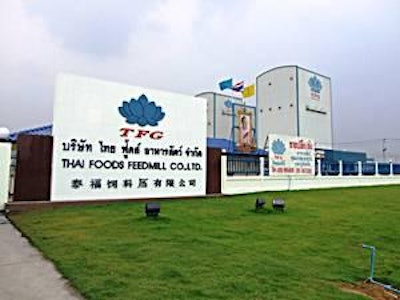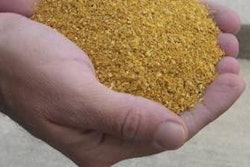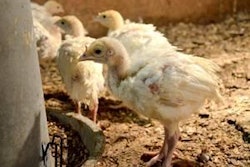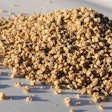
For many people connected with the Thai livestock industry, Charoen Pokphand Foods (CP group) and BetaGro are considered the key players. They have substantial market share in Thailand, plus both companies are expanding abroad.
However, Thai Foods Group has found another way to build profits. “The Thai Foods Group has a different strategy,” said Dr. Chaisaks Boonprasopthanachote, CEO of Thai Foods. “We, as a company, deliberately focus on the home market.”
Clearly, Thai Foods’ strategy is working. Since 2007, the company has seen a 100 percent increase in sales.
Contract producers
For any feed company, having contract producers is a logical move as this guarantees feed tonnage. Thai Foods has contract pig farms with around 350 sows, and these farms are supplied with breeding gilts from the company’s own breed pyramid, which has 400 GGP females, with Duroc and Yorkshire genes being imported from Denmark.
The pig group is averaging 23 pigs per sow per year, with weaning taking place at 24 days. Contract growers provide 1 million broilers a week for slaughter, with much of the chicken being exported as frozen product to China. Thai Foods also has contract layer farms as well. Thai Foods operates uniquely in Thailand, in that the company will act as guarantor for loans that contract producers wish to obtain from the banks, thereby making it much easier for these producers to get credit.
Key location
A distinct advantage for Thai Foods is its location. The company’s feed mill is strategically located in the Bangkok suburbs, which is in the middle of important corn-producing areas of central Thailand. The central location significantly cuts transportation costs, which are increasingly important as fuel prices rise.
Thai Foods’ plant is notable as it features two large towers that house the milling equipment. The two towers are species specific, with one tower producing 30,000 tons of pig feed per month and the other producing 45,000 tons of poultry diets monthly. Most of the poultry feed is fed locally, but Thai Foods does export 1,000 metric tons of broiler feed to Cambodia each month.
The logic behind having species-specific lines is that contamination is more easily avoided. If just one line had been built, Thai Foods would be concerned about traces of antibiotics in the pig feed contaminating the poultry diets. This can be a serious issue, as evidenced by a problem that occurred in the UK some years back. In that case, a large feed compounder was making multi-species feeds through one line, including race horse feeds. Naturally, great care was taken to clean the equipment between species feed runs.
Nonetheless, a race horse owner who was using the company’s feed was very upset and embarrassed when one of his top horses tested positive for a prohibited substance. As it turned out, the horse’s feed contained a substance that was banned for race horses, but was quite legal in other animal feed diets. Obviously the cleaning operation had not been 100 percent effective and the horse feed had become contaminated.
Wide ingredient range
Thai Foods uses a wide range of ingredients. Corn is the main energy source and the plant can store 24,000 metric tons in eight silos, each of which can hold 3,000 metric tons. Soybean meal is Argentinean, while dried distillers grains with solubles comes from the USA. DDGS used to be included at 8 percent, but this has dropped to 4 percent to 5 percent because of mycotoxin contamination problems. Cassava is used in the sow and finisher feeds. Ironically pig meat and bone meal, banned from UK animal feeds, are used, but only in the poultry feeds.
Rice bran oil is a useful energy source, whilst hulls from the rice bran are used as fuel for the plant’s boilers. Vitamins and trace minerals are imported singly from Degussa (Germany) and later blended together. Full-fat soya and hydrolyzed soya are used as protein sources in the piglet creep feeds, providing that the trypsin levels are 2 percent or lower. Whey powder is also a creep ingredient. Zinc oxide is included post-weaning for two weeks at 3000 ppm, and copper sulphate is used as a growth promoter in pig finisher diets.
Mill machinery
The mill machinery was sourced from Triumph, the well-known Thai feed equipment company. Each mix contains four tons of ingredients and mixing time is three minutes, 25 seconds per batch, with more than 95 percent of the feed being produced as 3.5 mm pellets. A palatability index is recorded for each batch and if there are any problems, future batches can be adjusted accordingly.
One feature of the plant is that it can produce extruded product, and Triumph has used the plant to develop and test a new extruder. Corn and full-fat soya are often put through an extruder to increase the feed value, but this has required a separate extruder for each ingredient. Triumph has developed an extruder that can handle both corn and full-fat soya, and this equipment has been undergoing proving trials. Three hundred tons of soya have successfully been put through the extruder and corn has been processed under test conditions. Naturally, having just one extruder cuts costs so that the cost of including extruded product adds just 0.7 baht (US$.02) to the price of 1 kg of feed.




